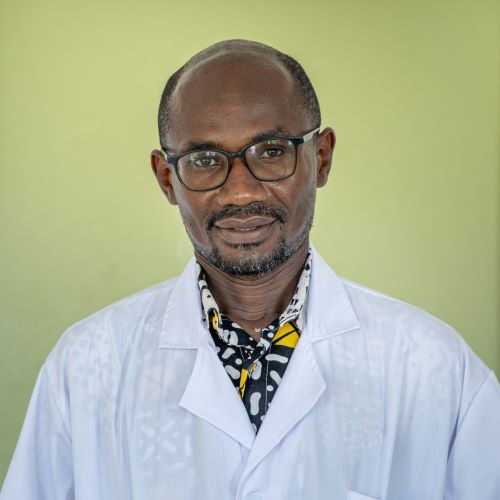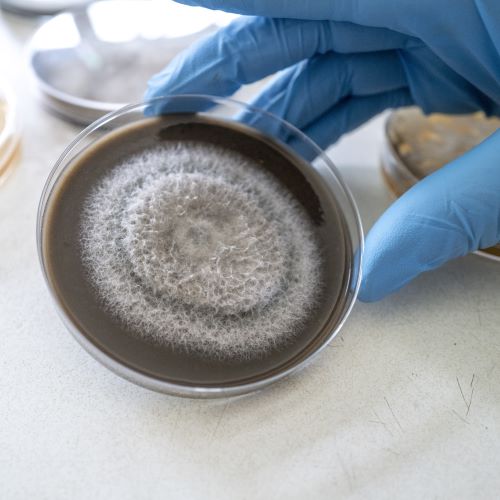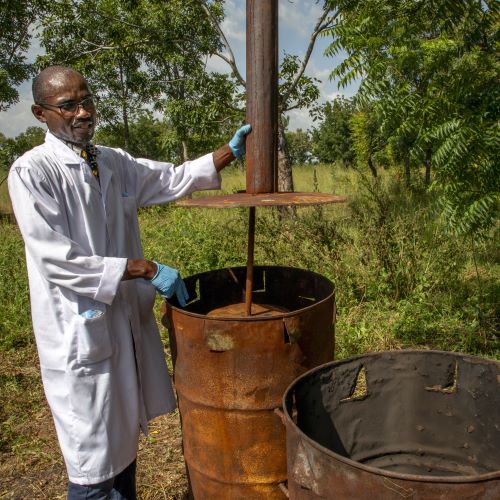Introduction
The audience-voted One-To-Watch award celebrated Zarouk’s innovation, Myco-Substitutes, an eco-friendly sewage treatment that uses viruses and fungi to treat and feed on faecal waste and produce yarns and a leather substitute. Zarouk spoke to us about his innovation and how it is addressing the poor management of faecal sludge.
News

1. Can you briefly describe your innovation and tell us what inspired you to create it?
Our technology concerns the Re-use of Faecal Sludge for Income and Environmental Quality Management (ROFSIEQ). We treat faecal sludge with bacteriophages, which are viruses that kill bacteria. Subsequently, we dewater the sludge, dry the solid matter and use it as a growth medium for a specialised species of fungi. These fungi hyphae are engineered to grow out as cotton-like and leather-like. The cotton-like hyphae are processed into thread and the leather-like hyphae are processed into a viable alternative to animal hide. The spent faecal sludge after mycelia harvesting is converted into briquettes to be used as a renewable energy source.
Myco-Substitutes developed the ROFSIEQ technology as a response to the poor management of faecal sludge, the limited availability of threads and leather for fabric and shoe making, and the loss of trees in the north of Ghana due to the heavy reliance on charcoal and fuelwood for domestic energy needs.

2. Can you tell us about the scalability of your innovation and the impact your innovation has had on society so far?
ROFSIEQ has promising potential for scale. We have workable prototypes and minimum viable products that are appealing to the stakeholders we have engaged so far (leather, fabrics, local fuel retailers). The mycelia yield from our specialised fungi isolates is comparable to internationally known ones, such as those of Mycotech lab and Myco Works. Myco-Substitutes is doing its best to reach scale in about a year from now. At scale, we can process an average of 1,000 yarns of threads per day, 100 square metres of mycelia leather and 1,000 kg of briquettes per day. When scaled, Myco-Substitutes can directly employ 200 people and create 1,000 indirect jobs in the first year. These numbers are expected to at least double after five years of operating at scale. We would need £500,000 to reach scale and we welcome investments from grant funders and angel investors.

3. We recently opened applications for the 2025 Africa Prize. Can you tell us about your experience of the Africa Prize programme so far and would you recommend it to other entrepreneurs?
The Africa Prize programme has changed our approach to the ROFSIEQ technology. Before the Africa Prize we were exploring just the scientific, technology, and engineering aspects of the technology without seeing it as a business. Thanks to the programme, we now know the worth of the technology. The Africa Prize has given us the capacity to make our technology investible. We are now able to build business cases and present better proposals that can attract investments. We belong to a big alumni community which presents several opportunities including partnerships, sharing lessons, experiences and information sharing, and technical support.
The Africa Prize for Engineering Innovation is the best programme for startups in Africa such as Myco-Substitutes, and I would recommend it to all Africans with innovative ideas.
